On September 24, the 2021 Global Advisory Board (GAB) Meeting of Tsinghua SPPM was held at Tsinghua University under the theme “Higher Education, S&T Development and Public Governance Striding toward Modernization.” A total of 15 GAB members and guests, including Ding Zhongli, Vice-Chairman of the Standing Committee of the 13th National People’s Congress and Chairman of the Central Committee of China Democratic League; Wan Gang, Vice Chairman of the 13th National Committee of the CPPCC, Chairman of the China Zhi Gong Party, and President of the China Association for Science and Technology (CAST); Gu Shengzu, Vice Chairman of the 13th National Committee of the CPPCC; Wang Zhigang, Secretary of the Leading Party Members’ Group of the Ministry of Science and Technology and Minister; Zhou Xiaochuan, Chairman (Chinese) of GAB, Vice-Chairman of the 12th National Committee of the CPPCC, and Vice Chairman of the Boao Forum for Asia; Qiu Yong, President of Tsinghua University; Chen Xu, Secretary of Party Committee; and Yang Bin, Vice President, participated in the meeting on-site. A total of eight GAB members and guests, including Danny Quah, Annual Chairman (International) of GAB and Dean of Lee Kuan Yew School of Public Policy, National University of Singapore, participated in the meeting online. Deputy Secretary of Party committee of Tsinghua University Xiang Botao and Vice President Peng Gang attended the meeting. Heads of related departments, democratic parties, and leaders and faculties of the school participated in the meeting. The opening ceremony was hosted by Prof. Jiang Xiaojuan, Dean of Tsinghua SPPM.
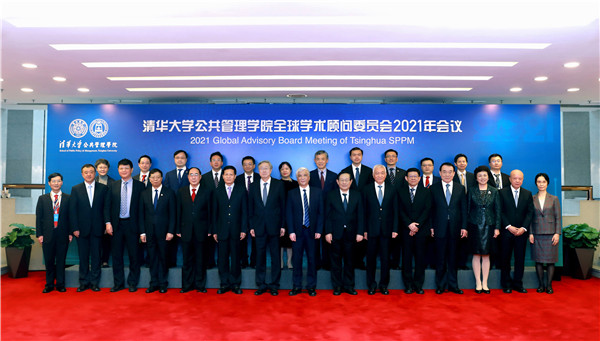
Opening ceremony and group photo
Opening ceremony and keynote speeches
Chinese GAB member Wan Gang, Vice Chairman of the 13th National Committee of the CPPCC, Chairman of the China Zhi Gong Party, and President of CAST, delivered a keynote speech titled “Science and Technology Innovation Striding toward Modernization and Globalization.” He noted that the international economic and social development encountered unprecedented impacts brought by the repeated cases of COVID-19 and its variants, and a new round of scientific and technological revolution and industrial transformation is just unfolding. Under this circumstance, joint response to the pandemic, climate change, and carbon neutrality challenges has gradually become a global consensus. Response to these challenges concerning the shared fate of humankind requires international scientific and technological circles to strengthen their high-level, open cooperation to provide systematic, high-quality solutions and effectively address shared concerns of people all over the world. Currently, emerging technologies represented by AI develop fast, becoming the critical driving force behind the industrial transformation. An example is the adaptation of technological innovation and industry development history in new energy vehicles. Wan Gang elaborated that cross-field collaboration is becoming an inevitable science and technology development trend, adding that going green and low-carbon is becoming a shared mission of global science and technology governance. He pointed out that the next five years will accelerate global scientific and technological renovation and industrial transformation. Global scientific and technological circles are expected to adapt to new demands and challenges, guide themselves with inclusive innovation, and realize science and technology ideas for education. They should also actively advocate the borderless, obstacle-free, and nondiscriminatory scientific spirit and cooperation ideas to implement the UN 2030 sustainability goals and jointly construct a human community with a shared future through practical actions of high-level, open collaboration.
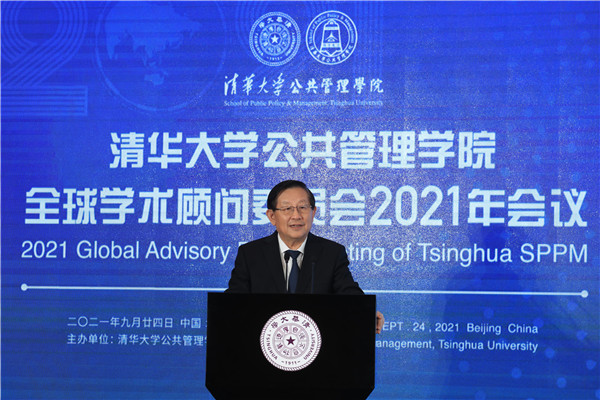
Wan Gang delivering a keynote speech
Gu Shengzu, Vice Chairman of the 13th National Committee of the CPPCC, delivered a keynote speech titled “Government Should Play A Leading Role in Realizing Carbon Neutrality.” He emphasized that the most significant issue of global public governance is the pandemic containment in the near term and the response to climate change in the long term. Climate change is the biggest market failure, whereas carbon neutrality is a significant global strategy concerning politics, economy, ecology, livelihood, and security and an important market opportunity involving industrial, energy, technological, and consumption revolution. Realizing carbon neutrality requires proper handling of the relationship between the government and the market. Greater attention is needed to be given to governments’ leading and guiding role at present. They need to participate actively in multilateral cooperation in response to climate change, balance the relationship between the right of development and the right of emission, and fulfill common yet distinguishing responsibilities. They have to discuss how they can jointly respond to climate change challenges, perfect planning and regulatory measures, develop dual-carbon roadmaps, and prioritize support to selected industries and regions that have peaked carbon emissions. Governments should also well utilize incentives and disincentives to drive emission reduction, innovate and perfect the institutional supply related to green and low-carbon transformation, and advance the revision and formulation of relevant laws and regulations, provide scientific and technological support and talent guarantee. They must make education supply more adaptive to the vision of carbon neutrality; guide low-carbon, zero-carbon, and negative-carbon technology research and development with the new system of pooling national resources and strengths; and gain the upper hand in green and low-carbon science and technology. Finally, they need to develop green finance, perfect the green financial market system, and prevent risks brought by transformation and financial innovation vigorously. Gu Shengzu noted that the realization of carbon neutrality ultimately requires transforming state will into corporate and citizen actions and better leveraging of markets’ role in the future to implant the gene of green, low-carbon ideas into the organism of high-quality development.
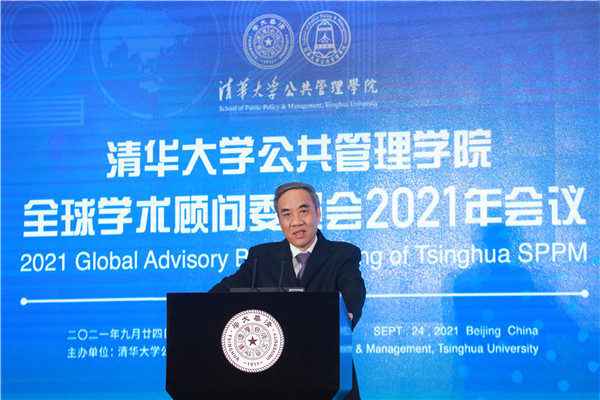
Gu Shengzu delivering a keynote speech
Zhou Xiaochuan, Chairman (Chinese) of GAB, Vice-Chairman of the 12th National Committee of the CPPCC and Vice Chairman of the Boao Forum for Asia, moderated the meeting. He pointed out that universities are expected to shoulder the mission of serving high-level technological to achieve self-sufficiency and drive the interactive development of high-quality university education and high-level scientific and technological innovation. Future public governance and talent development would be impossible without high-quality education.
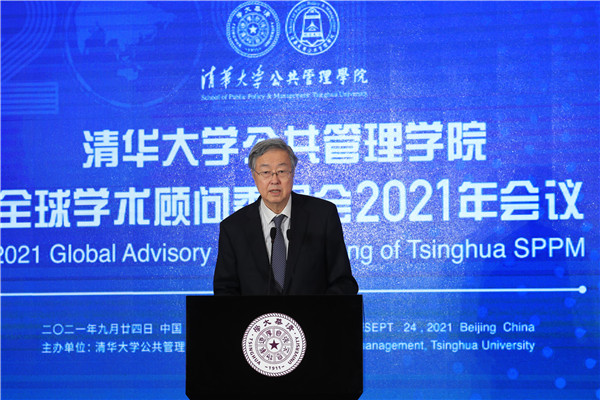
Zhou Xiaochuan moderating the meeting
Chinese GAB member Qiu Yong, President of Tsinghua University and CAS academician, extended a warm welcome to all guests present at the meeting on behalf of Tsinghua University. He said that 2021 has a great historical significance, as China started a new journey of building a modern socialist country in an all-around way. Under this background, this meeting under the theme “Higher education, S&T Development and Public Governance Striding toward Modernization” is of great significance. Modernization involves extensive fields, and the modernization of man is the key, which would be impossible without improving higher education. Tsinghua University has always explored the task of higher education modernization, which involves the construction of the university governance system and governance capabilities in the first place, the most important of which is upholding the leadership of the Party and driving institutional and cultural development. Today’s world faces growing uncertainties, and universities serve as bridges and ties of exchanges among different countries and civilizations. The Global Forum of University Presidents 2021, held on the eve of the 110th anniversary of the founding of Tsinghua University, formed the “Tsinghua Consensus,” laying down the need for future universities to be more open, integrated, and resilient, which will also be the direction higher education modernization efforts.
Qiu Yong mentioned that General Secretary Xi Jinping stressed during his inspection of Tsinghua University that the scientific research innovations of Tsinghua University are closely aligned with the development needs of the country, demonstrating the courage, determination, and commitment of the Tsinghua people. Scientific research innovations of universities must serve the national strategies and precisely benchmark themselves against the national needs and solve issues and problems faced in the national development with scientific and technological strengths, contributing to the development of human societies. Tsinghua has been committed to cultivating talents in scientific research activities and advancing high-level international scientific and technological cooperation. Facing the future, Tsinghua will also endeavor to construct a university innovation system to make itself a critical part of the national innovation system, encourage free exploration and conduct organized scientific research, and spearhead in terms of academic ecosystem construction. In recent years, Tsinghua University has established the Institute of Climate Change and Sustainable Development, Vanke School of Public Health, Institute of National Governance and Global Governance, and Institute for AI International Governance, High-Temperature Gas-Cooled Reactor Carbon Neutral Hydrogen Production Industry Technology Alliance, and Institute of Carbon Neutrality, which are important contributions to national and global pubic governance with scientific and technological innovation. All members are expected to raise comments and suggestions on the development strategy of SPPM to advance further public governance as an significant issue that concerns the present and future.
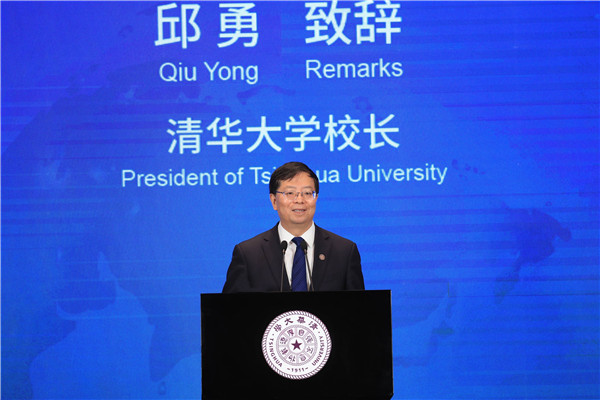
Qiu Yong delivering remarks at the opening ceremony
Chinese GAB member Chen Xu, Secretary of Party Committee of Tsinghua University and Chairperson of the University Council, pointed out that quality higher education marks the country’s development level and potential, affecting the prosperity of the Party’s cause and the lasting political stability, rise, and transformation of the nation. The fundamental source of the country’s scientific and technological innovation capabilities is its people. Universities are important integration points of science and technology as the first productive force and talent as the first resource. Tsinghua University is standing on a new historical starting point. It deeply advances its construction as a “double first-class” university, adapts to the trends of scientific and technological innovation, optimizes its structure of disciplines and majors, makes clear its direction of disciplinary development, grasps the patterns of disciplinary development and talent cultivation, strengthens its traditionally advantageous disciplines, and improves its characteristic disciplines with the mutual promotion and reinforcement between scientific and technological innovation and talent cultivation. Tsinghua SPPM actively responds to the needs of national modernization and the cutting-edge trends of world development and makes full use of the advantages of Tsinghua’s comprehensive disciplines, with satisfying achievements made in talent cultivation programs and academic exchange. Encompassing such topics as higher education, science and technology development, and public governance, this meeting raised numerous enlightening opinions and suggestions for developing Tsinghua University and SPPM. Chen Xu extended heartfelt thanks to the GAB on behalf of the university for its longtime concern about the various undertakings of Tsinghua University and SPPM. She hopes that SPPM will endeavor to make due contributions to raising the governance level of China and even the world with the meticulous guidance and generous support of all GAB members.
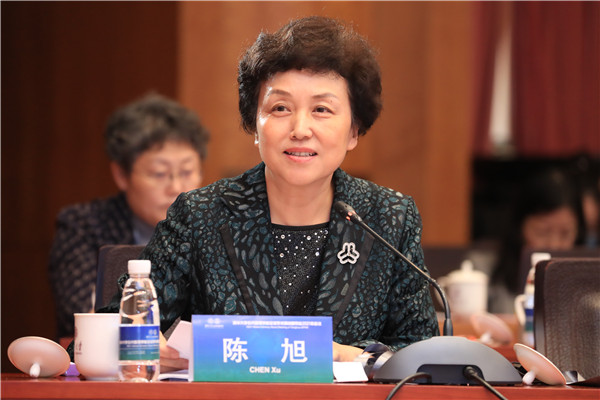
Chen Xu giving her remarks
Danny Quah, annual chairman (International) of GAB and Dean of Lee Kuan Yew School of Public Policy, National University of Singapore, delivered a keynote speech. He believed that students cultivated by schools of public policies and management are professionals expected to make a difference in the field of public governance in the future, who will become important makers of public policies. Thus, SPPM should support, help, and guide students in terms of transnational study, professional skills cultivation, and deep learning to enable them to have the qualities and capabilities required to work in the public governance field. Meanwhile, the schools also need to work hard on value shaping by educating students to keep in mind their mission to advance social progress and always concern themselves about the voice and well-being of society. Global governance has many issues, and human societies face numerous crises, but the Chinese expression of crisis involves challenges and inflexion points. The development and application of new technologies such as big data, AI, and algorithms pose new challenges to academic research in related fields and provide new approaches in solving some problems. Tsinghua SPPM is expected to overcome the development lag of traditional economics, political science, and public management compared with social development. It is also hoped to provide fresher and more advanced academic support to students to help them better cope with challenges that will emerge in public management and public affairs.
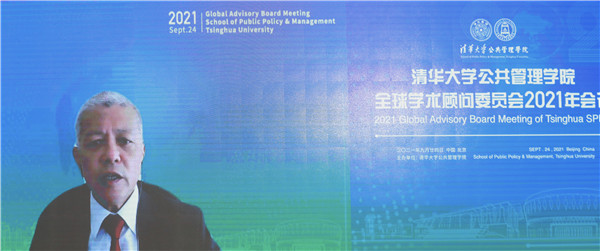
Danny Quah delivering a keynote speech
Jiang Xiaojuan, Dean of Tsinghua SPPM, reported to the GAB on the school’s work and development vision. She noted that China’s new journey of building a modern socialist country in an all-around way had posed new requirements for developing public management discipline. In the next 10 years of development, SPPM needs to combine well the commonality of modernization drive with characteristics of China’s modernization drive to cultivate excellent professionals serving local and global public governance. The theoretical issues of modernization drive should be combined with a response to realistic modernization drive issues to provide underpinning academic achievements for the modernization of the state governance system. SPMM must also advance S&T development while considering ethical issues of science and technology to drive S&T innovation to benefit human development and social progress. In the past year, SPPM restored its teaching order, saw its teaching and research professionals receive honors successively, and advanced disciplinary construction steadily. All GAB members also guided the work of the school painstakingly. In the future, SPPM will continue innovating in professional degree education, build up high-end think tanks, and serve the development of public management as a discipline. Jiang Xiaojuan hoped that GAB members would provide more valuable opinions and contribute foresight and insights on advancing the discipline of public management at the school in more forms and with higher quality.
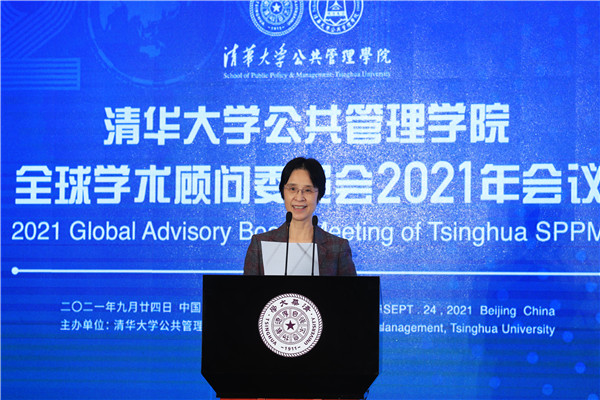
Jiang Xiaojun presenting a report
Plenary speeches at the meeting
Chinese GAB member Xie Fuzhan, President of the Chinese Academy of Social Sciences, delivered a speech titled “Public Management and Talent Cultivation under the Development of Internet and Digital Technology.” He pointed out that the rapid development and extensive application of the Internet and digital technology in today’s world pose unprecedented opportunities and challenges to public management. On the one hand, the Internet and digital technology play a vital role in various aspects. Digital empowerment and technological empowerment have increasingly enriched the digital governance toolbox. Governance has become increasingly precise and synergistic. On the other hand, Internet and digital technology are also a double-edged sword. Public governance faces risks and challenges brought by inadequate digital technology capabilities, absent and delayed supervision, and improper public management. Thus, the government needs to strengthen the cultivation of “versatile” interdisciplinary talents, enhance the training of public management professionals, and raise the professional accomplishments of government officials. It also needs to build up the discipline of public management, strengthen cross-disciplinary cultivation, and integrate the development of disciplines to raise the level of disciplinary construction effectively.
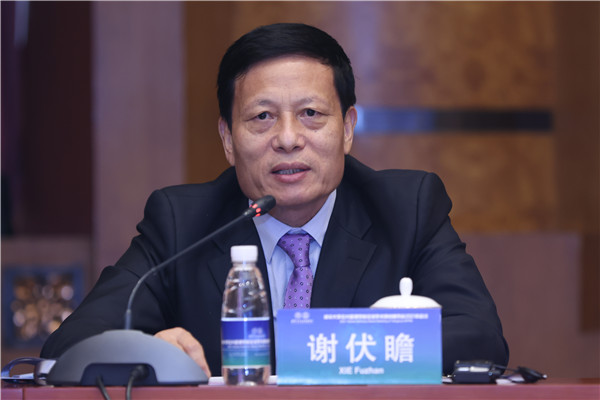
Xie Fuzhan delivering a speech
Li Bo, Vice President of IMF and former Deputy Governor of the People’s Bank of China, delivered a speech online.
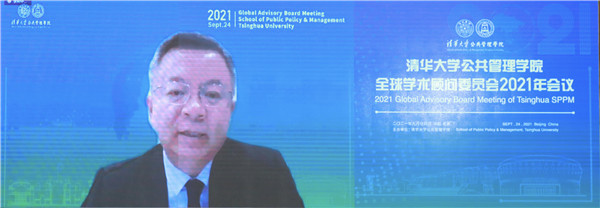
Li Bo delivering a speech
International GAB member Robert Orr, Dean of the School of Public Policy, University of Maryland, former President of the Network of Schools of Public Policy, Affairs, and Administration, Former Assistant Secretary-General of the United Nations, and Special Advisor to the UN Secretary-general on Climate, made a speech on the role of higher education in the 21st-century governance. He noted that S&T innovation and technological advancement are accompanied by inconsistency and discontinuity of global geopolitics, and higher education plays an increasingly important role as a bonding agent in public management. In response to climate change, higher education provides humankind with more technological means and cooperative governance models. He hoped that government, universities, and companies can conduct more research on multilateralism and public-private cooperation models, encourage the free flow of students among universities, break the barriers to the free flow of talent, and contribute to the global response to disastrous effects brought by climate change.
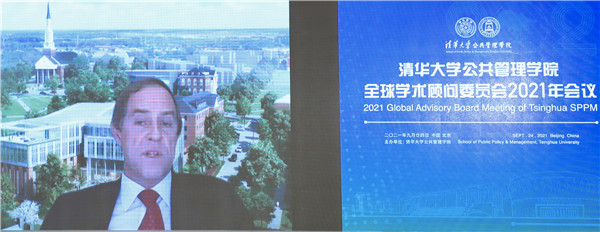
Robert Orr delivering a speech
Chinese GAB member Chen Deming, former Minister of Commerce of China, Former Chairman of the Association for Relations across the Taiwan Straits, and Director of Institute of Taiwan Studies, Tsinghua University, shared his thoughts starting with an inherent logic between public governance, university modernization, and S&T development. He believed that the essence of management is people management, which requires sparking the initiative and creativity of people under the existing institutional system. Meanwhile, present-day management is closely related to the present information age. The development and application of new technologies, such as big data and AI, mean that public management must have theoretical innovation. He used different policies across countries worldwide on information management under the environment of global information circulation as an example. He elaborated that China’s public governance should maintain its characteristics and align with international practices. He believes that topics such as climate change and realizing low-carbon objectives may be fields that can seek international cooperation under the current international situation.
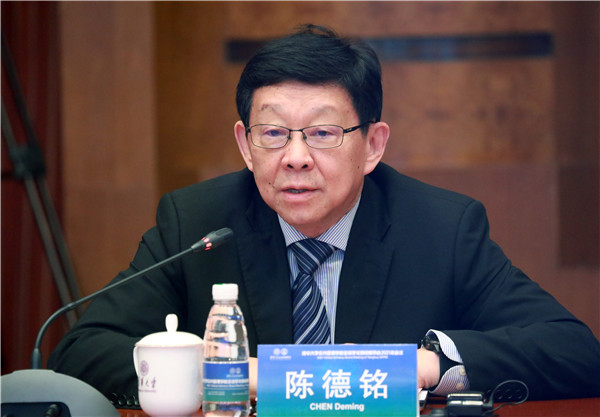
Chen Deming delivering a speech.
Chinese GAB member Huang Zhaohui, CEO of China International Capital Corporation Limited, gave a speech about the relationship between talent, S&T innovation, and the capital market. He believed that continuous S&T innovation only occurs when science and technology talents are organically combined with capital. Therefore, continuously fostering excellent talents through modern higher education; strengthening accumulated knowledge and technology innovation; leveraging the openness, inclusiveness, and influence of universities; and fostering an open mindset and international vision are needed. Other needs are transforming education into science and technology, making scientific findings applied at large scales and industrialized, and utilizing effective capital markets to provide funding and market-oriented incentive mechanisms for S&T innovation. CICC always tasks itself with serving the national strategies and real economy and hopes to contribute to promoting S&T innovation and realizing innovation-driven development in China in the future through greater cooperation with experts.
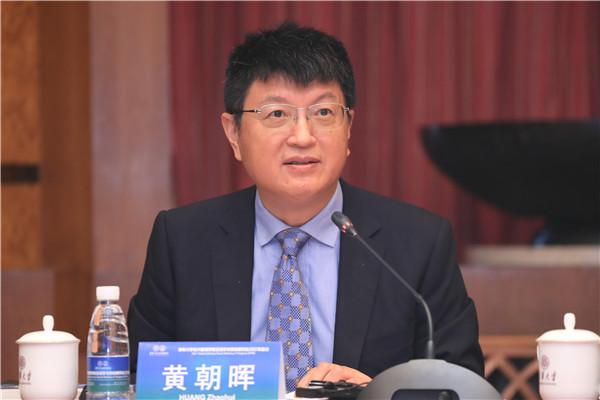
Huang Zhaohui delivering a speech
International GAB member Shigeo Katsu, President of Nazarbayev University and former Vice President of the World Bank, introduced the developments of Nazarbayev University, starting with the reality of Kazakhstan, and shared his viewpoints on higher education, S&T development and modernization of public governance. He believes that the present time is in an era where global public policy framework is effective and that universities have the greatest possible academic freedom and relatively sound mechanisms and systems. Talent cultivation oriented toward the future should focus on nurturing values centered on integrity, inclusiveness, transparency, and the spirit of social service. He emphasized that the human element is the most important part of the pursuit of advancement in science and technology and public governance. When the pandemic deeply affects social development, people must be put first, be it the fight against the pandemic, science and technology development, or public governance. The role of higher education is more important than ever and should make greater contributions to our societies.
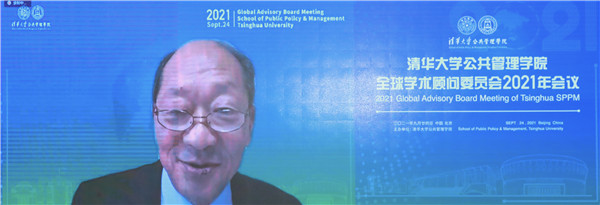
Shigeo Katsu delivering a speech
Chinese GAB member Wu Hongbo, the Special Representative of the Chinese Government on European Affairs, former Under-Secretary-General, United Nations, Adjunct Professor and Co-Director of the Institute for Sustainable Development Goals, Tsinghua University, and President of China International Public Relations Association, pointed out in his speech that the present-day global public governance faces three challenges. The first is the declining government credibility and public sentiments of distrust going rampant worldwide since the COVID-19 outbreak. The second is the widening rich-poor gap and the global COVID-19 pandemic, which call for more powerful management mechanisms and governments. The third is strengthening the public credibility of governments, which requires realistic accountability systems. He brought forward the need to combine the building up of public management with sustainable development, international practices, global digitalization and fostering the talent of international vision to improve international governance, the common interests of humankind, and local interests.
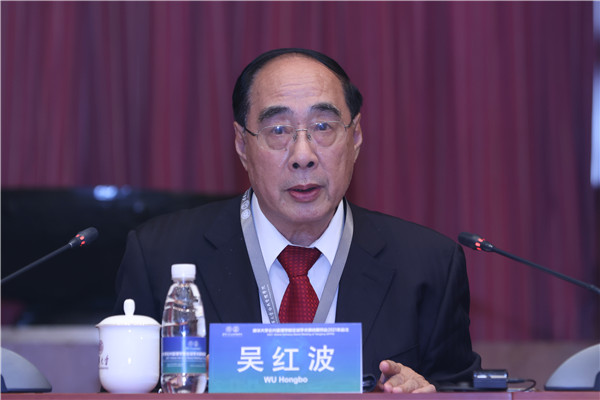
Wu Hongbo delivering a speech
Chinese GAB member Li Baodong, Secretary General, Boao Forum for Asia, and former Vice-Minister of Foreign Affairs, China, made a speech about the modernization of higher education, S&T innovation, and public governance. He believes that the aim and mission of education are to engage in scholarship, foster people, and pursue humanistic pragmatism. Higher education should be based on serving the national development strategy, engage in advanced scholarship, foster high-caliber talent, and contribute to a nation’s socio-economic development. In terms of S&T innovation, he believes China’s scientific and technological strengths have made significant headway in the past 70 years. China built an integrated planning and coordination system of “doing great things with concentrated strengths” and perfected the specific practices of “bring in, assimilate, and absorb” and “go global and bring in,” as well as incentive mechanisms and other experiences emphasizing spiritual and material welfare to leverage further the institution’s superiority. He noted that public management must focus on domestic and international dimensions. Domestically, public governance needs to encompass national development strategy and be carried out on specific practices such as rural revitalization. Internationally, it needs to participate in international affairs across the board.
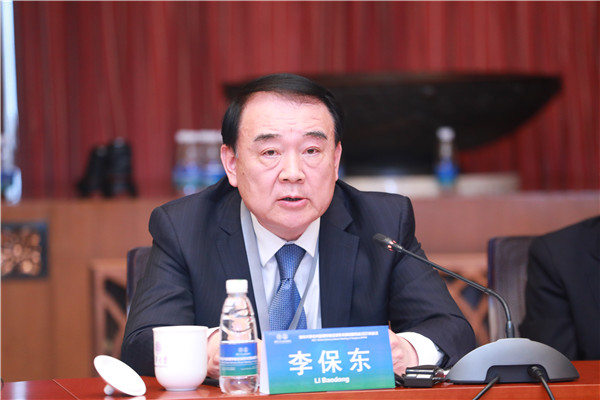
Li Baodong delivering a speech
International GAB member Yong-Hak Kim, President Emeritus and professor of Yonsei University and Chairman of the Board of SK Telecom, made a speech about how Korean higher education responded to the impacts of COVID-19. He noted that university students expected diversified campus experience and social networking but could not study in brick-and-mortar classrooms amid the pandemic, limiting their possibilities of gaining related experience and fostering interpersonal skills. Therefore, universities must lose no time to adopt new educational technologies to accommodate this change and establish VR diverse classroom environments in which students can achieve exchanges between people in virtual classrooms and campus environments. Furthermore, given the impacts of COVID-19, universities must accommodate the practical needs for cost reduction. He finally stated that, while IT applications helped universities with effective transition, online education platforms and AI posed new challenges to physical universities.
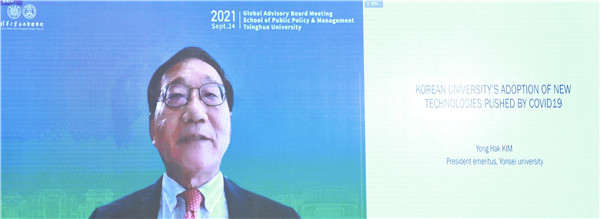
Yong-Hak Kim delivering a speech
Chinese GAB member Yang Bin, Vice President and Provost of Tsinghua University, made a speech about urgent needs for important professionals. He pointed out that numerous market entities at present longed for the understanding and carrying out of the inherent requirements to serve public interests more effectively, protect rights and interests of members of society, and respond to community needs timely, which is different from public relations, government relation, or social responsibility function initially set by numerous organizations. It involves rooting “cultivate virtue, serve society” into the starting point and cornerstone of organizations. Currently, numerous managers serving the interaction between companies and society lack the professional training of “serving society” and “sharing with the public.” Their work often shows tactical, interfacial, and ornamental characteristics instead of the essential, strategic, and systematic nature expected of organizations. Many market entities showing positive attitudes are important community members to resonate with a grand strategy and big layout. However, the lack of underpinning talent and skills with professional accomplishments and training means such hopes sometimes are easy to fall through. Similar to CIO and CHRO that play important roles, the demand for professionals responsible for ESG, privacy, and rights protection in future organizations will become bigger and more real. Such demand requires the talent cultivation programs of public policy and management schools to foster and improve professional abilities. Such initiatives make these professionals more willing to serve public interests more professionally and persistently in various market entities, playing a greater role in building a more harmonious future that can “share with the public.”
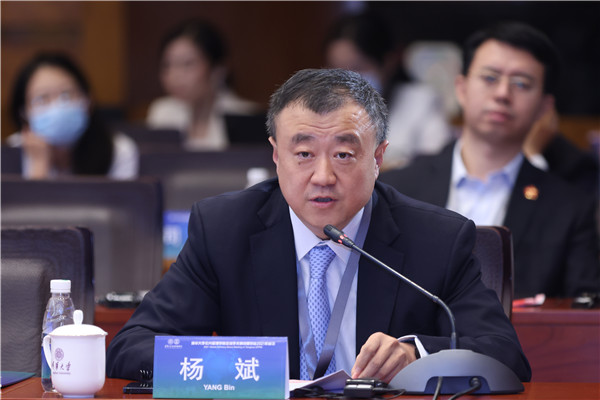
Yang Bin making a speech
Chinese GAB member Margaret Chan, Emeritus Director-General of the World Health Organization and Inaugural Dean of Vanke School of Public Health, Tsinghua University, talked about the modernization of public governance and education. She considered that COVID-19 showed the vulnerabilities of human societies and that the international community called for global cooperation and solidarity and better governance. In contrast, good governance needed to embody important principles like fairness, responsibility, and transparency. She suggested that China had entered a new stage of building a modern socialist country in an all-around manner, where providing Chinese people with good governance becomes more important than ever before. Tsinghua University and Tsinghua SPPM need to foster fully-fledged, talented people and leaders for fair, just, and good governance. Thus, students will be able to use their acquired knowledge and skills, fulfill their due responsibilities in public policymaking and related affairs, and play their expected roles in poverty governance, public health, and alleviation of climate change effects.
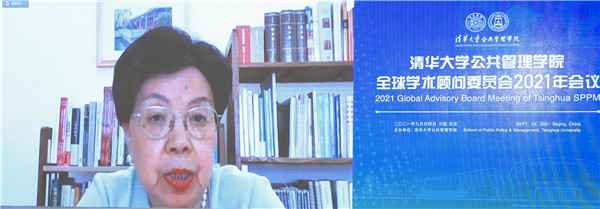
Margaret Chan delivering a speech
Chinese GAB member Lu Mai, former Vice Chairman of China Development Research Foundation, talked about the lifelong education of rural migrant workers. He noted that an undereducated group had formed in rural China because of longtime inadequate input in the educational system, which deserved attention in developing individuals, families, and society and realizing the objective of shared prosperity. Considering issues such as who should learn what with resources to be provided by whom and organized in what manner is urgent. He suggested that the lifelong education of rural migrant workers should pay close attention to populations with high or low school level knowledge, place equal emphasis on basic cultural knowledge and general knowledge, make full use of modern technology online and offline, and strive to be interesting and intriguing while resolving motivation issues to achieve collaborative efforts across regions and departments.
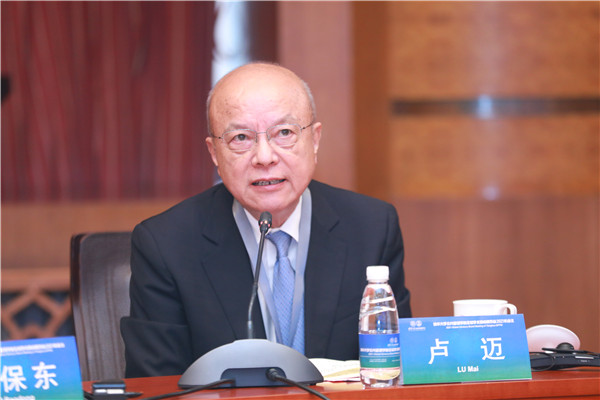
Lu Mai delivering a speech
International GAB member Aiji Tanaka, Professor and President of Waseda University, Japan, made a speech about how Waseda University responded to opportunities and challenges brought by the pandemic and digital transformation. He noted that the accelerated digital transformation amid the pandemic had posed higher requirements for digital skills. Higher education must provide students with required, complementary academic skills to cope with challenges. Therefore, higher education institutions should develop or set educational tools to help students acquire these skills and realize high-quality academic discussions simultaneously. Waseda University ensures all students conduct evidence-based speculative discussions by offering courses such as multi-linguistic paper writing, mathematical thinking, mathematical science, and information science. Meantime, it has established a data science center and a research innovation center to conduct interdisciplinary education and cooperates with top-class universities and research-oriented companies to strengthen students’ originality and academic research capabilities.
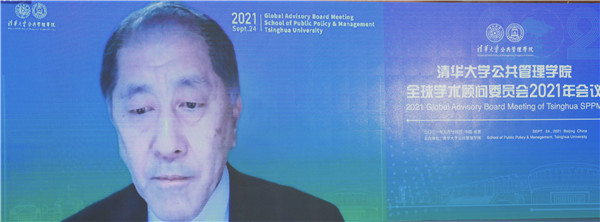
Aiji Tanaka delivering a speech
Danny Quah, the Annual Chairman (International) of GAB, Professor and Dean of Lee Kuan Yew School of Public Policy, National University of Singapore, noted in his wrap-up speech that this meeting was informative and set the direction for the development of public management discipline. He added that we are facing challenges and pitfalls, such as geopolitical disputes, the rise of populism, and the prevalence of de-globalization, which test whether human societies can achieve successful development in the 21st century. On the one hand, attention needs to be paid to openness, inclusivity, and a humanistic spirit to ensure science and technology development benefits all humankind while realizing high-quality scientific advancements. On the other hand, higher education needs to become the bonding agent for international exchange and transnational cooperation. Tsinghua SPPM should play a crucial role in connecting different organizations and universities.
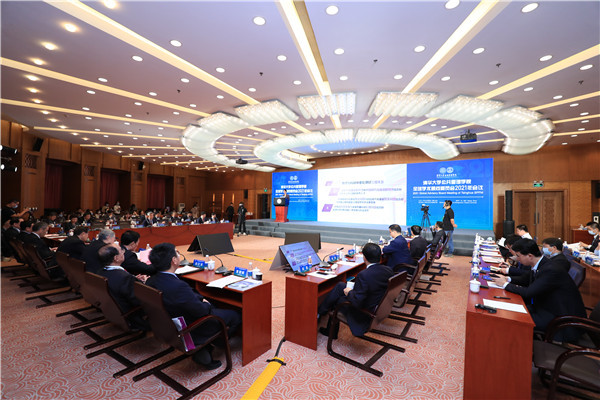
A scene of the meeting